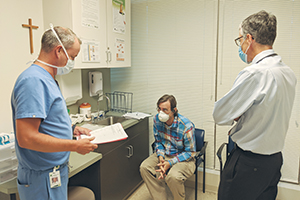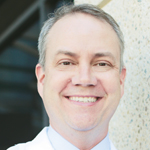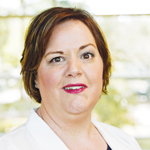By NANCY FOWLER
Any cancer diagnosis may come as a shock but a lung cancer diagnosis can be particularly shattering. Statistically, it's more deadly than any other cancer, with more than half of patients dying within a year of diagnosis, according to the American Lung Association.
A year-and-a-half-old program in Savannah, Georgia, is helping patients better process the fear and other emotions around a lung cancer diagnosis while expediting access to treatment intended to cure, or, if that is not possible, to improve the quality of life and likelihood of longer term survival for its patients. The Lung Cancer Rapid Access Team at the Nancy N. and J.C. Lewis Cancer & Research Pavilion is operated by the Savannah-based St. Joseph's/Candler Health System.

Dr. Marc Bailey, left, and Dr. Doug Mullins discuss a treatment plan with patient Rudd Long. Bailey and Mullins were leaders in creating St. Joseph's/Candler Health System's Lung Cancer Rapid Access Team.
Patients are referred to the program by a physician after a suspicious finding during a primary care exam, or on a lab test or X-ray, and often before a conclusive diagnosis has been rendered. Appointments are usually set within a week. In the space of an afternoon, patients hear from a team of physicians.
The goal is to have all testing done before the initial appointment, so the lung cancer specialists can evaluate test results and devise a treatment plan. Occasionally though, out-of-town patients who live in areas where the diagnostic test battery is unavailable may undergo a lung function test, scans and/or biopsy on the same day they meet with the program's clinicians. Patients who are candidates for surgery can be scheduled for an operation the following week.

Bailey
The process can condense into a 14-day period an ordeal that might otherwise take up to six weeks — enough time for the disease to become more advanced, according to thoracic surgeon Dr. Marc Bailey. Hastening treatment for aggressive cancers is good for the patient, the community and St. Joseph's/Candler, Bailey said.
"It's good for the health system because it brings in more early stage, treatable cancers and curable cancers," Bailey said. "So it's a good thing for all involved."
'Wait one second'
Normally, before patients arrive for their initial in-person appointment, a pulmonologist, radiation oncologist, cardiothoracic surgeon and medical oncologist discuss and evaluate their case. The initial appointment can be overwhelming for patients who may feel bombarded by medical terminology or a less than ideal prognosis.
"The nurse navigator will sometimes literally put her hand up and say, 'Wait one second — what they're saying is this and that,' and she completely translates it," Bailey said. "This also can be grounding for us, as physicians, too."

Coleman
Dana Coleman has been the program's nurse navigator since its launch in February 2019. She's guided approximately 100 patients through treatment thus far. Her job begins before patients arrive for their first visit. She lets people know what to expect and advises them to bring a family member or friend to help process the flood of information. Coleman makes sure her patients understand normal lung function so they can better comprehend their test results and she explains the different types of treatment that may be proposed, be it surgery, radiation, chemotherapy or palliative care, or a combination of any or all of the therapies.
"We truly take an interest in the patient, listen to their fears, their anxieties, and answer questions that they may have," Coleman said.
Coleman also may refer patients to a hospital social worker, chaplain or nutritionist. She remains a resource for them — just a phone call away.
Coleman said many patients with new lung cancer diagnoses may have quit smoking as long as 20 years ago. (Smoking — whether current or past — contributes to 80 percent of lung cancer deaths in women and 90 percent in men.)
"They may kind of blame themselves," Coleman said of the program's patients. She helps patients work through that and focus on what will give them the best quality of life. Early diagnoses set the stage for the best care outcomes.
Coleman hopes the outreach of the program and its hospital system to physicians in outlying areas will encourage newly diagnosed patients and those with suspicious medical test findings to seek immediate care at St. Joseph's/Candler.
"Our overall goal is to get these patients diagnosed before they're Stage 3 or 4," Coleman said.
Outreach to African Americans
Most of the program's patients live in Savannah. But up to 30% travel from surrounding areas, including South Carolina's Lowcountry, a stretch between Savannah and Charleston that is home to a large retirement population. Eighty-six percent of those living with lung cancer are 60 and over.
Most of the clinic's patients are white. The hospital continues to reach out to primary care physicians with predominantly African-American patients, and offer screenings and education in majority African-American spaces, Coleman said.
Serving this population is particularly important given that the age-adjusted lung cancer rate for Black men is approximately 30% higher than for white men, despite their lower overall exposure to cigarette smoke. For Black women, the incidence is the same as that of white women even though Black women smoke fewer cigarettes, according to research cited by the American Lung Association.
Just do it
Bailey and pulmonologist Dr. Doug Mullins led the creation of the Lung Cancer Rapid Access Team. No one is turned away from the program for a lack of health insurance or inability to pay, Coleman said, calling the policy part of the health system's mission. The program gets some of its referrals from free clinics for the uninsured operated through the health system's mission services department, headed by Sr. Margaret Beatty, RSM. Sr. Pat Baber, RSM, directs two of the clinics making referrals, St. Mary's Health Center and the Good Samaritan Clinic at St. Joseph's/Candler.
"It's not just something we say to make us look as if we take care of our community," Coleman said. "We do take care of our community."
Mullins, Coleman, Bailey and other clinicians fold their Lung Cancer Rapid Access Team hours into their regular workload. The program sees patients on Monday and Tuesday afternoons.
At the outset, the team decided to move forward with the program in an agile way, fixing issues as they arose rather than anticipating every potential hiccup.
"We just said, 'We're going to figure this out,'" Bailey said. "If we'd waited until every single thing was perfect, it would never have gotten started."
One thing they could have never imagined: The COVID-19 pandemic. The program shut down for two months but resumed in June. The pandemic became an incentive for looking further into transitioning some of the initial visits to telehealth, especially for patients from outside Savannah.
As the medical staff looks to the future of the program, Bailey believes it will continue to grow as an important resource for patients. Coleman says the program hopes to add another pulmonologist and medical oncologist and become a center of excellence mainstay in the St. Joseph's/
Candler cancer service line.
From fear to optimism
The Lung Cancer Rapid Access Team definitely has been a good thing for Geri Sharp of the Savannah area. Sharp, 71, was diagnosed in March 2019 with limited stage small cell lung cancer, a stage that usually involves the fast-growing cancer being confined to one lung. According to the American Cancer Society, only one in three patients with small cell lung cancer are diagnosed at this earlier stage when a cure may be possible for some people.
Sharp went to urgent care for a bad cough and got referred to the program. She arrived at her intake appointment frightened and discouraged.
"I walked in and saw all these doctors there and I thought, 'This isn't good,'" Sharp said. "I was afraid they'd say it couldn't be treated."
But she learned her lung cancer was treatable. Over three months, Sharp underwent four rounds of chemotherapy and 40 radiation treatments. She's now in remission.
Recently, doctors found a spot on one lung, and as Catholic Health World went to press, she was awaiting results of a PET scan.
"I am very optimistic that, if the cancer has come back, they can take care of it," Sharp said. "I feel very thankful to have the doctors I have there; they're very caring and very, very thorough."